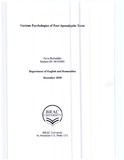| dc.contributor.advisor | Haq, Kaiser | |
| dc.contributor.author | Rafiuddin, Zarin | |
| dc.date.accessioned | 2011-02-23T06:08:31Z | |
| dc.date.available | 2011-02-23T06:08:31Z | |
| dc.date.copyright | 2010 | |
| dc.date.issued | 2010-12 | |
| dc.identifier.other | ID 08103002 | |
| dc.identifier.uri | http://hdl.handle.net/10361/777 | |
| dc.description | This thesis is submitted in partial fulfillment of the requirements for the degree of Bachelor of Arts in English, 2010. | en_US |
| dc.description | Cataloged from PDF version of thesis. | |
| dc.description | Includes bibliographical references (page 66-67). | |
| dc.description.abstract | The post-apocalyptic genre is quite a popular one. People are fascinated by what will happen at the end of the world as we know it. Most popular post-apocalyptic fictions, however, are more stereotypical in nature which posits causes and effects. Yet some writers do explicitly portray postmodemist elements in post-apocalyptic fiction. In my paper I will illustrate the various psychologies of post0apocalyptic texts. Some texts concern themselves with power hierarchies, others with isolation and some with the continuation of sexism even in a society of the future. I will analyze the texts I have chosen for this paper to illustrate these points. | en_US |
| dc.description.statementofresponsibility | Zarin Rafiuddin | |
| dc.format.extent | 67 pages | |
| dc.language.iso | en | en_US |
| dc.publisher | BRAC University | en_US |
| dc.rights | BRAC University thesis are protected by copyright. They may be viewed from this source for any purpose, but reproduction or distribution in any format is prohibited without written permission. | |
| dc.subject | English and humanities | |
| dc.title | Various psychologies of Post-Apocalyptic texts | en_US |
| dc.type | Thesis | en_US |
| dc.contributor.department | Department of English and Humanities, BRAC University | |
| dc.description.degree | B.A. in English | |

